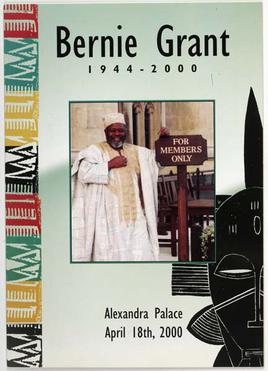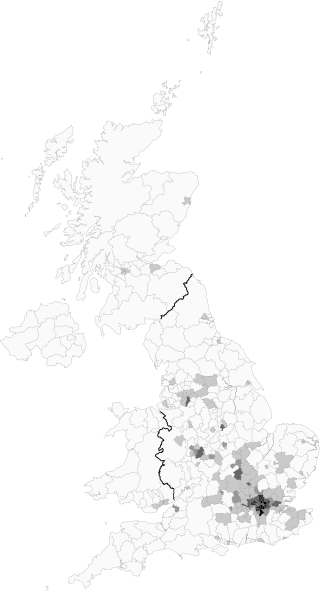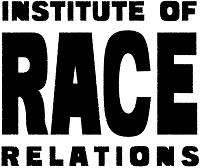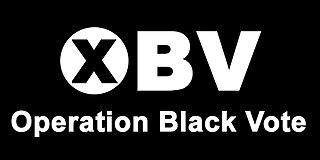Black is a racialized classification of people, usually a political and skin color-based category for specific populations with a mid to dark brown complexion. Not all people considered "black" have dark skin; in certain countries, often in socially based systems of racial classification in the Western world, the term "black" is used to describe persons who are perceived as dark-skinned compared to other populations. It is most commonly used for people of sub-Saharan African ancestry and the indigenous peoples of Oceania, though it has been applied in many contexts to other groups, and is no indicator of any close ancestral relationship whatsoever. Indigenous African societies do not use the term black as a racial identity outside of influences brought by Western cultures. Following the murder of George Floyd in 2020, several style guides, including the AP Stylebook, changed their guides to capitalize the "b" in black in 2020. The ASA Style Guide says that the "b" should not be capitalized. Some perceive the term "black" as a derogatory, outdated, reductive or otherwise unrepresentative label, and as a result neither use nor define it, especially in African countries with little to no history of colonial racial segregation.

Bernard Alexander Montgomery Grant was a British Labour Party politician who was the Member of Parliament for Tottenham, London, from 1987 to his death in 2000.
The Runnymede Trust is a race equality think tank in the United Kingdom. It was founded in 1968 by Jim Rose and Anthony Lester as an independent source for generating intelligence for a multi-ethnic Britain through research, network building, leading debate and policy engagement. It is led by its director, Dr Halima Begum, who was appointed in September 2020. Its chairman is Sir Clive Jones.

British Chinese are people of Chinese – particularly Han Chinese – ancestry who reside in the United Kingdom, constituting the second-largest group of Overseas Chinese in Western Europe after France.

Black British people are a multi-ethnic group of British citizens of either African or Afro-Caribbean descent. The term Black British developed in the 1950s, referring to the Black British West Indian people from the former Caribbean British colonies in the West Indies now referred to as the Windrush Generation and people from Africa, who are residents of the United Kingdom and are British.

Southall Black Sisters (SBS) is a non-profit organisation based in Southall, West London, England. This women's group was established in August 1979 in the aftermath of the death of anti-fascist activist Blair Peach, who had taken part in a demonstration against a National Front rally at Southall Town Hall. In 1980, SBS successfully campaigned against virginity testing in the UK, a policy that was being used to verify the authenticity of Asian marriages by checking the state of women's hymens.
In politics and history the Black Unity and Freedom Party (BUFP) was a political organisation that was part of Britain's Black Power and Radical left movements.

British African-Caribbean people are an ethnic group in the United Kingdom. They are British citizens whose ancestry originates from the Caribbean or they are nationals of the Caribbean who reside in the UK. There are some self-identified Afro-Caribbean people who are multi-racial. The most common and traditional use of the term African-Caribbean community is in reference to groups of residents continuing aspects of Caribbean culture, customs and traditions in the UK.

The Institute of Race Relations (IRR) is a think tank based in the United Kingdom. It was formed in 1958 in order to publish research on race relations worldwide, and in 1972 was transformed into an "anti-racist think tank".

Kaleidoscope Trust is a nonprofit organisation that campaigns for the human rights of LGBT+ people around the world. Its mission is to help create a world where LGBT+ people are free, safe and equal everywhere. The Rt Hon. the Lord Fowler is President of the Trust, and Simon Millson is the current Chair of the Trust Board.

Operation Black Vote (OBV) is a British non-partisan and not-for-profit national organisation established in 1996, which addresses the Black British and ethnic minority democratic deficit. OBV uses voter registration campaigns in minority ethnic communities, and encourages community engagement in minority ethnic communities to address supposed racial inequalities in areas including education, health, and employment. The director of OBV is Simon Woolley.

Racism in the United Kingdom refers to negative attitudes and views on race or ethnicity within the viewpoints of groups or individuals or existing systemically in the United Kingdom. The extent and the targets of racist attitudes in the United Kingdom have varied over time. It has resulted in cases of discrimination, riots and racially motivated murders. Racism was uncommon in the attitudes and norms of the British class system during the 19th century, in which race mattered less than social distinction: an African tribal chief was unquestionably superior to an English costermonger. Use of the word "racism" became more widespread after 1936, although the term "race hatred" was used in the late 1920s by sociologist Frederick Hertz. Laws were passed in the 1960s that specifically prohibited racial segregation.

Augustine John is a Grenadian-born writer, education campaigner, consultant, lecturer and researcher, who moved to the UK in 1964. He has worked in the fields of education policy, management and international development. As a social analyst he specialises in social audits, change management, policy formulation and review, and programme evaluation and development. Since the 1960s he has been active in issues of education and schooling in Britain's inner cities such as Manchester, Birmingham and London, and was the first black Director of Education and Leisure Services in Britain. He has also worked in a number of university settings, including as visiting Faculty Professor of Education at the University of Strathclyde in Glasgow, as an associate professor of education and honorary fellow of the London Centre for Leadership in Learning at the UCL Institute of Education, University of London, and visiting professor at Coventry University. A respected public speaker and media commentator, he works internationally as an executive coach and a management and social investment consultant.

The Ahmed Iqbal Ullah Race Relations Resource Centre is "one of Europe's leading specialist libraries on migration, race and ethnicity" open to members of the public as well as to students and researchers. It increases access to and visibility of Black, Asian and Minority Ethnic (BAME) histories with a growing archive of material relating to the local area. Its sister organisation, the Ahmed Iqbal Ullah Education Trust offers advice, training, networking opportunities, project support, exhibitions, publications and events to help community organisations to record and share their heritage. The Centre is part of the University of Manchester and is located in Manchester Central Library, where it is part of the Archives+ partnership. The current head of both the Centre and the Trust is Dr Safina Islam, who was appointed in March 2019.
The Anti-Racist Alliance (ARA) was a British anti-racist organisation formed in November 1991. It was established mainly by black activists in the Labour Party.

Online Hate Prevention Institute (OHPI) is an independent harm prevention charity established in 2012 and based in Australia.
Labour Party Black Sections (LPBS), commonly known as Black Sections, was a caucus in the United Kingdom, made up of African, Caribbean, and Asian Labour Party members from 1983 to 1993.
The Black Power Movement in Montreal in the 1960s was a period of rediscovering black identity through a process of invoking cultural, economic, and political thought amongst blacks. The eruption of political activism during Montreal's Quiet Revolution as well as the reformation of immigration policies which discriminated against non-white immigrants allowed black communities to publicly express and bring awareness to their struggles with racism. The movement was an integral component of the emerging global challenges to imperialism during the 1960s, stemming from various movements including Garveyism, pan-Africanism, the Harlem Renaissance, Rastafari, and others. Montreal's Black Power movement culminated in the aftermath of the Sir George Williams Affair—a student occupation that resulted in an estimated $2 million worth of damages and 97 arrests—which raised concerns of racism worldwide.

The COVID-19 pandemic has revealed race-based health care disparities in many countries, including the United States, United Kingdom, Norway, Sweden, Canada, and Singapore. These disparities are believed to originate from structural racism in these countries which pre-dates the pandemic; a commentary in The BMJ noted that "ethnoracialised differences in health outcomes have become the new normal across the world" as a result of ethnic and racial disparities in COVID-19 healthcare, determined by social factors. Data from the United States and elsewhere shows that minorities, especially black people, have been infected and killed at a disproportionate rate to white people.
Gerlin Bean is a Jamaican community worker who was active in the radical feminist and Black nationalist movements in the United Kingdom in the 1960s and 1970s. Trained as a nurse, she became a dedicated community activist and social worker, involved in the founding of the Black Women's Action Committee of the Black Unity and Freedom Party, the women's section of the Black Liberation Front, the Brixton Black Women's Group, and the Organisation of Women of African and Asian Descent (OWAAD). Bean's work and activism focused on eliminating discriminatory policies for people of color, women, and people with disabilities. She fought for equal educational opportunity, fair wages, adequate housing, and programs that supported families, such as counseling services, child care, and health care.












